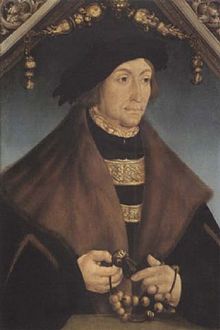George of the Palatinate
| George of the Palatinate | |
|---|---|

Bishop George of the Palatinate, contemporary painting on wood
|
|
| Noble family | House of Wittelsbach |
| Father | Philip, Elector Palatine |
| Mother | Margaret of Bavaria-Landshut |
| Born |
10 February 1486 Heidelberg |
| Died | 27 September 1529 (aged 43) Kislau Castle in Bad Mingolsheim |
| Buried | Speyer Cathedral |
George of the Palatinate (10 February 1486 – 27 September 1529) was Bishop of Speyer from 1513 to 1529.
His parents were Elector Palatine Philip and his wife Margaret of Bavaria-Landshut, a daughter of Duke Louis the Rich.
He held posts as canon in Mainz, Trier and Speyer and was Provost in Mainz from 1499 to 1506. From 10 November 1502, he was also Dean of St. Donatian in Bruges. Later, he was priest at Hochheim and Lorch. On 12 February 1513, he became Bishop of Speyer. He studied theology in Heidenberg in 1514 and received his Holy Orders on 10 July 1515. On 22 July 1515, he was consecrated as bishop.
George sought to improvide discipline among the clergy in his diocese and forbade the study of the writings of Martin Luther. However, he could not prevent his suffragan bishop Engelbrecht from converting to the new faith. On 28 April 1523, he published his most memorable letter to his clergy, which states:
The suspect teachings of Luther, which oppose the Holy Catholic Church and our ancient traditions, we must mention to our great distress, have been sprinkled and sown among the uneducated believers in many places and parishes in our diocese by pastors and preachers and others, who were not nominated by us or our vicars general, causing not only aberrations, riots, murder and dangerous movements among the communities .... We urge you to hold Mass without any improprieties, with seclusion, seriousness, respect, dignity and prudence, with as much devotion as possible, in the fear of our Lord, and to instruct people, not only by teaching them the wholesome Catholic doctrine, but also by good actions, by an irreproachable conduct and to encourage them by example to be pious, so that when all the trouble and the contempt for the clergy have been removed, we, as fighters for Christ and mediators between God and the people, may be able to prevent our eternal damnation by prayer and by good works
...
Wikipedia
